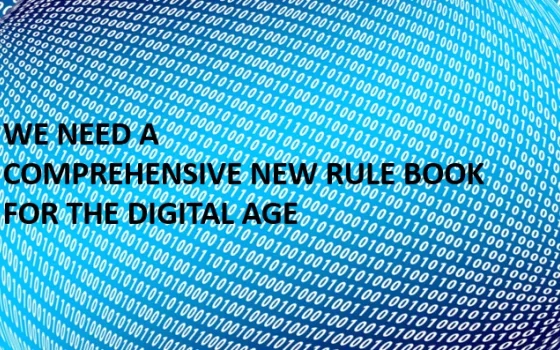The rapid digitization of the world:
The world is rapidly digitising. Estimates put the current size of digital economy anywhere between 15% - 30% of the global GDP. It will be safe to assume that 80% of the world’s GDP will be digital or digitally enabled in the next 20 years.
Over the last 10 years we have witnessed rapid digital innovation spanning borderless social and professional networks, media going online and international, emergence of global tech giants, scaling of e-commerce and cross border trade, rise of fintech, automation of industries and automobiles, connected homes and devices, etc. And we are just getting started.
This new digital world runs on technology and data. Digital businesses have created significant new value for consumers and businesses. Consumers are now connected, get convenient and personalized services. Entrepreneurs and enterprises have new business opportunities, new avenues to innovate, disrupt and grow.
The foundations of the digital world as we are experiencing today were laid over several decades post-world war including conceptualization of computing devices, invention of internet, introduction of microprocessors, mass production of personal computers, and culminated in the invention of the highspeed wireless communications and smart connected devices. Governments around the world encouraged the adoption of these technologies without much regulation.
Digital platforms evolved, riding on the back of the technology backbone, and reshaped our lives in many aspects spanning web search, social networking, e-commerce and streaming media. Digital became mainstream making information, entertainment, goods and services affordable, accessible and personalized, enhancing our lives in many ways. We cannot underplay the significant positive impact these technologies and digital platforms have had on our individual lives and society.
“digital platforms have reshaped our lives in many aspects making information, entertainment, goods & services affordable, accessible and personalized”
The need for a comprehensive new rule book for the digital age:
As with anything new, digital platforms, businesses and consumers are all facing and dealing with their own challenges: personalization intruding into user privacy, user data being used for various purposes without consent, misuse of social media, discretionary moderation of social media, lack of content ownership and censorship guidelines, concerns of behaviour modifications, questions on fair competition and trade practices, vulnerabilities to cybercrime and fraud, inequitable taxation across operating tax jurisdictions, evolving regulations around data protection, etc.
Consumers are often trading their personal data and privacy to receive basic services from these digital platforms, are knowingly or unknowingly getting locked-in to these digital platforms for lack of portability and due to the network effect, and unwittingly letting their social behaviour be modified. Where consumers do have the awareness of these impacts and influences, they lack the bargaining power to negotiate fair terms and have no alternatives. With digital platforms increasingly becoming embedded into day-to-day life, consumers are left compelled to abide by their terms.
Small businesses lack the capital, scale, access to data and technical expertise to be able to compete with the digital platforms. The larger digital platforms are demonstrating oligopolistic behaviour and acting as gatekeepers of the digital world.
Governments and regulators have picked up some of these matters and drafted (or in the process of drafting) policies/ regulations in “bits and pieces”. These efforts are ongoing in isolation across several jurisdictions, without comprehending the many overlapping and intersecting areas, with little collaboration with the industry, and not enough participation by people/ consumers.
This kind of approach by governments could lead to an ever-changing raft of ill-thought-out regulations and risk of excessive state control and/or surveillance, further leading to stifling of innovation and business disruptions due to regulatory uncertainties. The digital world could descend into chaos!
In the absence of a comprehensive policy and regulation, digital platforms have been merrily riding along, creating rules for the digital world, operating on their own terms, pushing the boundaries, becoming gatekeepers of the digital world, a pseudo-state of sorts, and creating enormous wealth for their stakeholders. It is but natural that they want to remain self-regulated to protect their advantageous position.
"in the absence of comprehensive regulations, digital platforms have been operating on their own terms, and the tech giants have stepped in to become gatekeepers of the digital world; it is but natural that they will want to remain self-regulated to protect their advantageous position"
The time has come to create a new rule book for the digital age. We need the lawmakers to lay down clear and comprehensive framework to protect the interest of the citizens, the small businesses, and the states, while also acting as guardrails for digital businesses to innovate, operate and be successful in a fair, transparent and stable regulatory environment.

This is akin to: (i) standardizing insurance policy wordings by the regulators, which protects the consumers who lack the expertise to understand, have no reasonable way to compare products, and lack the bargaining power while dealing with a large corporation; (ii) mandating mobile number portability, that ensured consumers are not locked in by any service provider; and (iii) establishing of open banking ecosystem, intended to enable seamless data exchange between financial service providers built around customer consent; all this and more rolled into one.
At the same time, it is important to recognize that governments do not have the expertise and foresight to be able to think through all aspects and create such a comprehensive framework. It is also unlikely that any major regulatory change can be brought about without disrupting businesses and life. It is therefore very important for the law makers to collaborate across the borders, with the industry, and with consumer interest groups to embark on this journey of digital regulations.
Governments representing the largest share of the digital economy and the largest populations should take the lead in creating an alliance and formulating laws and regulations for the digital world.
Revisiting the fundamental rights and duties:
The boundaries of fundamental rights, especially that of freedom of expression, has been a challenge even in the conventional world. In the digital world, the impact of one’s expression is significantly amplified due to the “network effect”, therefore making it an important matter to address without compromising the fundamental right of free speech. Also to consider are additional rights that may have to be given in a digital world, such as the right to stay anonymous and/ or getting non-personalized services, right to free internet access, etc. After all, we cannot imagine a world where a section of the society is disconnected from all the prosperity because they didn’t have the tools to be “present” in the digital world.
“fundamental rights in a digital world should consider freedom of expression, right to stay anonymous, and right to free internet”
Establishing user privacy and data rights:
User privacy and data protection are areas that are much deliberated. Yet, there are no clear means established which truly balances the rights of the consumers while also enabling the businesses to personalize services. The solution should revolve around user’s right to choose the level of personalization, as well as the disclosure of all personal data gathered and used by platforms (either captured directly or through partners) for any sort of personalization before and after such information gathering. The user rights and service provider obligations should also extend to government services to ensure no agency is using data for propaganda or surveillance of citizens.
“solution should revolve around user’s right to choose the level of personalization and disclosure of all personal data gathered and used by platforms”
Formulating content ownership, moderation, and censorship rules:
Content may be created by journalists or members of a social media platform; in a digital world it can be accessed widely/ publicly. On one side, it is necessary to clearly identify the creator/author and protect the author’s rights. On the other hand, it is equally important to ensure accuracy and completeness of information, and accountability for any misinformation.
“it is important that the same established standards of content moderation are used across all platforms in any given jurisdiction”
Also, it is important that the same established standards of content moderation are used across all platforms in any given jurisdiction. There cannot be any room for the platforms to impose self-moderation and/or self-censorship that may be biased in any way due to the organization’s values and beliefs (owing to the beliefs/ values of the managers/ operators). Either all platforms apply the same content curation guidelines, or all platforms are made to publish content with no restrictions. Digital platforms cannot have different rules compared to the traditional media. And allowing platforms to selectively moderate content will lead to institutionalization of biases. Establishing a framework for content moderation for platforms that operate across jurisdictions is a particularly complicated matter due to the different belief systems, but nevertheless remains a very important matter to address.
Instituting fair trade practices and competition:
The scale and sophistication of digital platforms is threatening competition and financial viability of small/ conventional/ independent businesses, and the dominance of platforms is ever increasing with more data and advancing technologies. The problems for small businesses are varied: traditional businesses simply struggling to adopt digital technologies, to not having access to consumers who are locked into the larger platforms, to larger platforms misusing their dominant position to unfairly compete with smaller players and push them out of business.
Consumers on the other end are left with little choice in “winner takes all” space. Consumers’ social/ professional relationships and behavioural intelligence is virtually seized by networking platforms and are therefore forced to stay for the lack of alternatives/ interconnectivity of platforms.
“it is imperative to establish interoperability standards across platforms and give users the right of portability”
Smaller businesses and consumers should have the right to access their data from other competing/ alternative platforms such that there is always healthy competition (and room for more competitors) with no market dominant player assuming a “monopoly” position. It is imperative to establish interoperability standards across platforms and give users the right of portability.
Prevention of cybercrime and fraud:
All over the world, legal and law enforcement systems have had to be adapted to digital reality. The rapid onboarding of new/ first-time users into the digital world has left many vulnerable to cybercrime and fraud. Even the most regular users are prone to sophisticated criminals who are constantly finding new ways to defraud people. Just like safety of persons and property has been a primary trait of a “good” physical society, the digital world needs cybersecurity policing and enforcement for everyone to embrace digital with trust and confidence. This becomes extremely important as more and more of the basic services for citizens, including financial services and government services, move online.
“the digital world needs cybersecurity policing and enforcement for everyone to embrace digital with trust and confidence”
Ensuring equitable taxation
Most of the big tech companies are able to circumvent taxes by creating a network of companies in tax-free/ low-tax regimes and via smart accounting (convoluted ways of revenue and cost booking) to avoid/ minimize taxes. The “developed” countries where some of the large tech companies are domiciled may be more than happy for the lower taxes to be paid in their jurisdiction, unfairly leaving out the other countries/ jurisdictions from where the big tech companies generate profits. Accounting and taxation standards have to be established to ensure global digital businesses are taxed in the countries of operation proportionately to their revenues from the respective regions.
To find more such content you can connect on LinkedIn and Twitter:-
https://www.linkedin.com/in/mruthyunjayappa?miniProfileUrn=urn%3Ali%3Afs_miniProfile%3AACoAAAGg2TkBFFCnzN21NWDKxG9nA60qn20B63w&lipi=urn%3Ali%3Apage%3Ad_flagship3_detail_base%3BdWu7mJOISca%2BFrQDWC568A%3D%3D
https://twitter.com/Mruthyunjayappa




















